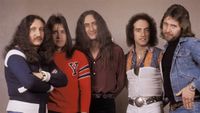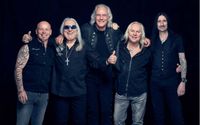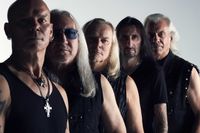Uriah Heep are an English Hard Rock, Heavy Metal, and Progressive Rock band, formed in London in 1969. Their current lineup includes lead and rhythm guitarist Mick Box, keyboardist Phil Lanzon, lead vocalist Bernie Shaw, drummer Russell Gilbrook, and bassist Davey Rimmer. Of this lineup, Box is the only remaining original member. Throughout many lineup changes, the band has included many notable musicians, such as vocalists David Byron, John Lawton, John Sloman, Peter Goalby and Steff Fontaine, bassists Gary Thain, Trevor Bolder, John Wetton, Bob Daisley and John Jowitt, drummers Nigel Olsson, Lee Kerslake and Chris Slade, and keyboardists Ken Hensley and John Sinclair.
Over the course of their 51-year career (2020), Uriah Heep have released twenty-four studio albums (of original material), twenty live albums and forty-one compilation albums (including two greatest hits albums composed of re-recorded material: Celebration – Forty Years of Rock and Totally Driven). Twelve of the band's studio albums have made it to the UK Albums Chart (Return to Fantasy reached No. 7 in 1975) while of the fifteen Billboard 200 Uriah Heep albums Demons and Wizards was the most successful (#23, 1972). In the late 1970s the band had massive success in Germany, where the "Lady in Black" single was a big hit.
The band maintains a significant following and performs at arena-sized venues in the Balkans, Germany, Japan, the Netherlands, Russia and Scandinavia. They have sold over 45 million albums worldwide with over 4 million sales in the U.S, where its best-known songs include Easy Livin, The Wizard, Sweet Lorraine, and Stealin.
Early days (1967–1971)
The band's origins go back to 1967 when 19-year-old guitarist Mick Box formed a band in Brentwood called Hogwash, which began playing in local clubs and pubs. When the band's singer left, drummer Roger Penlington suggested his cousin David Garrick (who knew the band) as a replacement. Box and Garrick instantly formed a songwriting partnership and, having higher musical aspirations than their colleagues, decided to give up their day jobs and go professional. They set up a new band called Spice; it was then that David Garrick changed his surname to Byron. Drummer Alex Napier (born 1947 in Glasgow, Strathclyde, Scotland) joined, having answered a music paper ad; bassist Paul Newton of the Gods completed the line-up.
From the very beginning, Spice avoided playing covers and, according to Box, always strove "...to do something original." Managed initially by Newton's father, the band climbed their way up to The Marquee level, then got signed by Gerry Bron (the Hit Record Productions Ltd.'s boss) who saw the band at the Blues Loft club in High Wycombe. "I thought they were a band I could develop and I took them on that basis," remembered Bron later. He became the band's manager and signed them to Vertigo Records, the newly formed Philips label. The four-piece found themselves booked into the Lansdowne Studios in London, still under the name of Spice. Then the name was changed to that of the well-known character from David Copperfield, Uriah Heep (for, according to biographer Kirk Blows, "Dickens' name being everywhere around Christmas '69 due to it being the hundredth anniversary of his death"). According to Dave Ling's 2001 autobiography of the band, Wizards and Demons, The Uriah Heep Story, though the "Uriah Heep" moniker was chosen in December 1969, the band continued to play gigs as "Spice" until Ken Hensley joined in February 1970. Uriah Heep then decided to widen the sound. "We'd actually recorded half the first album when we decided that keyboards would be good for our sound. I was a big Vanilla Fudge fan, with their Hammond organ and searing guitar on top, and we had David's high vibrato vocals anyway so that's how we decided to shape it," Box recalled. Gerry Bron brought in session player Colin Wood, followed by Ken Hensley, a former colleague of Newton in the Gods, who was then playing guitar in Toe Fat. "I saw a lot of potential in the group to do something very different," remembered Hensley.
Their 1970 debut album, …Very 'Eavy …Very 'Umble (released as Uriah Heep in the United States), introduced Hensley's heavy organ and guitar-driven sound, with David Byron's theatrical, dynamic vocals soaring above thunderous sonic backgrounds, although acoustic and jazz elements also featured in the mix. The album's title references the signature phrase of the Dickens character Uriah Heep ("very 'umble"). Hensley had little to contribute to the debut: Box and Byron wrote most of the material, including "Gypsy", in many ways (according to Blows) "...a marriage of contrasts" that, in time, became their trademark. In a 1989 interview, Mick Box recalled, "The funny thing was we wrote it at the Hanwell Community Centre, and Deep Purple were rehearsing in the room next door to us. You can imagine the kind of racket we were both making between us." During the winter of 1970, three quarters into the recording of the album, drummer Alex Napier was replaced by Nigel Olsson, recommended to Byron by Elton John. The debut was not popular with rock critics (especially in the USA where Rolling Stone reviewer Melissa Mills infamously promised to commit suicide "if this band makes it") but in retrospect the attitude towards it changed. "Those unfamiliar with Uriah Heep may want to try out Demons and Wizards or a compilation first, but anyone with a serious interest in Uriah Heep or the roots of heavy metal will find plenty to like on ...Very 'eavy ...Very 'umble," advised critic Donald A. Guarisco. In the course of the album's making the writing relationship between Box, Byron and Hensley was beginning to develop. "It was very quick, because we were all into the same things. It was like it was meant to be, there was that kind of chemistry," Mick Box recalled.
When Nigel Olsson returned to Elton John's group in the spring of 1970, Keith Baker took his place. The band's second album, Salisbury (February 1971), was more squarely in the progressive rock genre, with its 16-minute title track featuring a 24-piece orchestra. One of the album's tracks, "Lady in Black", described as, "...a stylishly arranged tune that builds from a folk-styled acoustic tune into a throbbing rocker full of ghostly harmonies and crunching guitar riffs," became a hit in Germany upon its re-release in 1977 (earning the band the Radio Luxemburg Lion award). Produced by Gerry Bron, the second album went a long way to (according to AllMusic) perfect Uriah Heep's "blend of heavy metal power and prog rock complexity" and was also significant for Ken Hensley's instant rise to the position of main songwriter.
In December 1970 Keith Baker left the band and was replaced by Iain Clark (from another Vertigo band Cressida). With him the band toured Germany in late December 1970/January 1971 and made their first US tour in the spring of 1971, supporting Three Dog Night and Steppenwolf.
By this time, Gerry Bron's deal with Philips/Vertigo was over, so he set up his own label, Bronze Records. The third album was recorded in the summer months of 1971, during the band's three visits to Lansdowne. "It was the point in time when the band really found a solid musical direction," said Bron later. The third album, Look at Yourself, released in October 1971, marked the solidification of disparate ideas that had been a prominent feature of Salisbury and presented the unified sound and direction. Among the stand-outs were the title track, "Tears In My Eyes" and July Morning, an epic many Heep fans regard as equal to Led Zeppelin's "Stairway to Heaven" and Deep Purple's "Child in Time". "I think that 'July Morning' is one of the best examples of the way the band was developing at that point in time. It introduced a lot of dynamics, a lot of light and shade into our sound," Ken Hensley said. The album peaked at No. 39 in the UK.
Success (1972–1976)
By the end of 1971 it became clear, according to Hensley, that he, Byron and Box had become the tightly knit nucleus of the band. Feeling marginalised and having recently been badly shaken up when he was involved in an accident in Germany in one of the band's cars, first bassist Paul Newton left, in November of '71, and was briefly replaced by Mark Clarke. Newton recalled in a 2000 interview on Uriah Heep's website his departure: "Well, as you know, my father managed the band in the early days, with the Gods and Spice. He bought a lot of the gear and so on. When we became Uriah Heep and Ken joined the band – and Ken is the first to admit it – he had very definite ideas about what he wanted to do in a band. I suppose in some ways it was like the band was a vehicle which Ken needed and used to put his own ideas together. And there's nothing wrong with that as such. I mean, let's face it, the fact that what we did was successful was great for me too. But after a while you're bound to get some in-fighting in a situation like that. There were other problems too, because Gerry Bron was now the manager and my father was trying to get back some money from him - get some of his money back on the equipment and so on. There was a lot of unhappiness on all sorts of levels and everybody was unhappy in a lot of ways. I actually wanted to leave the band for quite a while before I actually left but I didn't. Anyway, with the heavy work schedules and the pressures and so on, I ended up collapsing on stage one night and the other members of the band decided I should go. It was funny because I didn't want to go and there was a lot of animosity but at the same time it was a tremendous relief".
During that same November, Iain Clark was replaced by Lee Kerslake, once of the Gods. New Zealander Gary Thain, a then member of Keef Hartley Band, joined Uriah Heep as a permanent member in February 1972 halfway through another American tour, replacing Mark Clarke who was exhausted and nearing a mental breakdown. "Gary just had a style about him, it was incredible because every bass player in the world that I've ever known has always loved his style, with those melodic bass lines," Box later said. Thus the "classic" Uriah Heep formed and, according to biographer K. Blows, "Everything just clicked into place."
The result of this newly found chemistry was the Demons and Wizards album, which reached No. 20 in the UK and No. 23 in the US in June 1972. While its title and Roger Dean's sleeve both suggested that the band was romantically working medieval myth into their songs, and surely songs like "Rainbow Demon" and "The Wizard" (co-written by Mark Clarke, during his short stay) did have thematic links with fantasy world, a more straightforward, hard-rocking approach was also apparent. To discard any possible insinuations concerning any kind of concept behind it, Hensley's note on the sleeve declared the album was "...just a collection of our songs that we had a good time recording." Both critics and the band's aficionados hold the album in high regard, which, according to AllMusic, "...solidified Uriah Heep's reputation as a master of gothic-inflected heavy metal." Ken Hensley remembered:
The band was really focused at that time. We all wanted the same thing, were all willing to make the same sacrifices to achieve it and we were all very committed. It was the first album to feature that line-up and there was a magic in that combination of people that created so much energy and enthusiasm.
Two singles were released from the album: "The Wizard" and "Easy Livin' ", the second (a defiant rocker, according to Blows, "...tailor-made for Byron's extrovert showmanship") peaked at No. 39 on the Billboard Hot 100. Six months later, in November 1972, Uriah Heep's fifth studio album The Magician's Birthday (#28 UK, No. 31 USA) came out, with "Sweet Lorraine" released as an American single and the title track (a multi-part fantasy epic featuring Hensley–Byron vocal duel and Box's extensive guitar solo in the middle) being the album's highlight. "Uriah Heep used to have an image, now they have personality," wrote Melody Maker in 1973. Much of it stemmed from the flamboyant Byron. "David was the communication point, the focal point of the whole group's stage presentation. He had so much charisma, so much ability," admitted Hensley many years later. But Hensley too developed into a sophisticated instrumentalist and stage persona, whose writing and keyboard flair ignited the rest of the band.
A lavishly packaged (an eight-page booklet plus) double album Uriah Heep Live followed, recorded at the Birmingham Town Hall in January 1973. Having completed another Japanese tour, the band (due to tax problems) went abroad to record to Chateau d'Herouville in France. It was there that the solid, but rather mainstream-sounding, Sweet Freedom (#18 UK, No. 33 USA) was created with "Stealin'" released as a single. Having gained worldwide recognition, the band quit the fantasy world in lyrics and made an obvious stab at versatility by adding funk ("Dreamer") and an acoustic number along the lines of contemporary singer/songwriters ("Circus") elements to the palette. Ken Hensley meanwhile had been gradually recording his own, mellower material; his solo debut Proud Words on a Dusty Shelf was released the same year.
Wonderworld (June 1974), recorded in Munich's Musicland Studios in January, disappointed fans and band members alike. "Recording abroad disrupted the band's normal method of operation and that had a big negative effect on the group. Our communication was falling apart, we were arguing over stuff like royalties and we were getting involved in matters beyond music," Hensley said. Box remembered weeks spent in the studio as "dramatic" for all the wrong reasons. "David was drunk for most of the time, Kenny was having an emotional time of it and I was constantly trying to help them so it was difficult for me too. There was also a little bit of friction because (artistic) Kenny didn't like all the attention that (flamboyant) David was getting." Gary Thain was in even more serious trouble. According to Blows, "A strenuous touring schedule, compounded by the bassist's heavy drug dependency (inherent even before joining Heep) was taking its toll, though matters came to a head while on tour during September," when the bassist received a serious electric shock on stage in Dallas during a gig at Southern Methodist University’s Moody Coliseum on 15 September 1974. The rest of the US tour was then canceled and their UK dates rescheduled to October. Soon after going out of hospital, Thain, in Sounds, openly accused manager Gerry Bron of having turned Uriah Heep into a mere "financial thing" and was fired two months after the group's final gig of 1974 at New Theatre in Oxford, England on 14 December. A year later, on 8 December 1975, Gary Thain was found dead in his Norwood Green home, having overdosed on heroin.
John Wetton (ex-Family and King Crimson) joined the band in March 1975 and with him Return to Fantasy (June 1975) was recorded; representing a revitalised Uriah Heep, it soared up to No. 7 in the UK. "It was a relief to have someone solid and reliable, and he had a load of ideas too," Box remembered. The following "Year-long world tour" (according to a headline in NME), was marred by a new accident. Mick Box fell off stage in Louisville, Kentucky on 2 August 1975, breaking the radial bone in his right arm (but he persevered through both the set and the tour, receiving three injections a night). On 26 March 1976 at Roy Wilkins Auditorium in St. Paul, Minnesota, John Wetton had an accident of his own when he (like his predecessor, Thain) received an electric shock on stage.
In November 1975 The Best of Uriah Heep compilation was released, preceded by two solo albums: Byron's debut Take No Prisoners and Hensley's second, Eager to Please.
High and Mighty followed in June 1976. It was considered lightweight; even Box stated: "less of the 'eavy and more of the 'umble" (making pointed reference to Uriah Heep's self-description as "'umble" in Dickens' David Copperfield). The matter of production here became the point of major contention. With Bron committed to non-musical projects (including his air-taxi service) the band decided to produce the album themselves. The manager later insisted the result was Heep's worst album, while Hensley accused the manager of deliberately ignoring the band's interests. The album, though, was launched in the most lavish manner (with journalists and business people being flown off to the top of a Swiss mountain for a reception). However, it was not matched with the quality of live concerts, which were increasingly chaotic due to Byron's inconsistency on stage. "He'd always got drunk after the show but it had never got to the point where it would jeopardize the show itself. The performance had always been first and foremost with David. It was when the show started to come second that the problems began," Hensley remembered. "The distance between David and the rest had grown to unworkable proportions," according to Blows. "It's a tragedy to say it but David was one of those classic people who could not face up to the fact that things were wrong and he looked for solace in a bottle," commented Bron. In July 1976, after the final show of a Spanish tour, Byron was sacked. Soon bassist John Wetton announced he was quitting. Obviously he was not comfortable in the band, nor were his colleagues with him. Hensley later explained, "When he joined, we thought that we could replace a great bass player (Thain) with another great bass player, but we ignored the personality factor, which is crucial. It was like grafting on a new piece of skin but it just didn't work—the body rejected it."
Post-David Byron period (1977–1981)
Uriah Heep recruited bassist Trevor Bolder (ex-David Bowie, Mick Ronson), and after having auditioned David Coverdale (Deep Purple, Whitesnake), Ian Hunter and Gary Holton (Heavy Metal Kids), brought in John Lawton, formerly of Lucifer's Friend and the Les Humphries Singers, with whom they turned totally away from fantasy-oriented lyrics and multi-part compositions back towards a more straightforward hard rock sound typical of the era. Box later said, "Image-wise he wasn't quite what we were looking for, but his pipes were perfect and so we went for the music end of it." Hensley agreed: "He had a voice that I thought would give a new dimension."
Firefly was released in February 1977, displaying "renewed effervescence and energy in unveiling what was clearly a new beginning for Heep" (per. K. Blows), "a new vigour and confidence" (according to a Record Mirror review) and also the new singer's abilities: the latter (according to AllMusic), although lacking the multi-octave range of David Byron, "…boasted an impressive and emotionally rich hard rock voice that instantly jelled with the Uriah Heep sound." The band then toured the USA supporting Kiss. Paul Stanley later recalled, "They were incredibly professional, and so consistent that their worst nights were excellent and their best were tremendous."
Innocent Victim, released in November 1977, "had a slight edge on Firefly" according to Box, but still in retrospect this "...blend of sharp, short rockers and pop-friendly ballads" looked like "an attempt to court the American AOR market." The single "Free Me" (whose "acoustic style and accent on harmonies brought the group dangerously close to Eagles territory," according to AllMusic) became an international hit. In Germany the album sold over a million copies and became Uriah Heep's most successful, which coincided with the success of the re-released "Lady in Black." For some time during this period, there were three Uriah Heep singles sitting together in the German Top 20, these being "Wise Man" (from Firefly), "Lady in Black" and "Free Me".
In the end of 1978, Fallen Angel came out, having completed a hat-trick of studio albums to feature a consistent lineup (only the second time in their career that they had done so). "Too poppy" for Mick Box's liking (but still, "too eccentric to fit the bill of an AOR record," according to Allmusic), it was well received at the time (Sounds gave it 4 stars) but failed to chart. Meanwhile, the relative stability of the Lawton period belied the behind the scenes unrest having to do with Ken Hensley's earning much more than his colleagues. "Everything he wrote, he had to use… And if you insist in using everything you end up with substandard albums," disgruntled Box opined. The major rift, though, developed between Hensley and Lawton. As K. Blows writes, "the combination of constant friction between the two (resulting in the nearest thing to violence the group had seen) and the constant presence of Lawton's wife on the road finally led to the vocalist getting the chop, shortly after playing the Bilzen Festival in Belgium in August 1979."
Ex-Lone Star John Sloman was brought in, a younger singer who played keyboards and guitar and was, in the words of Box, "...an all rounder." But almost instantly, Lee Kerslake departed, after a row with Bron, whom the drummer accused of favouritism towards Hensley's material. Several tracks of the next album had to be re-recorded with a new drummer, Chris Slade (of the Manfred Mann's Earth Band). Conquest LP was released in February 1980 and received 5 stars from Record Mirror, but, according to Box, "was a difficult album to record" and represented "a confused Heep," even "a mess" (in the words of Trevor Bolder). The band went on the 10th Anniversary Tour with Girlschool as support and attracted respectable crowds. Hensley was very unhappy, primarily with Sloman, and he explained why:
The band had chosen John and I had opposed that decision. He was a good musician and he looked great but I thought he had little going for him vocally. The way that he interpreted songs were totally different to the way I had written them. I could understand wanting to move on but this was like the difference between Black Sabbath and Gino Vannelli. We weren't addressing our basic problems, in that we weren't re-establishing our musical direction and John definitely wasn't helping us to do that.
A meeting at the manager's office concerning the songwriting dissent was the last straw and, in September 1980, Hensley quit. Gregg Dechert, a Canadian who had worked with Sloman in Pulsar, came in and the band went on a 23-date tour of the UK. After that Sloman left, citing musical differences for a reason. He would later go on to work with UFO, Gary Moore and Robert Palmer. Hensley's acrimonious departure left the group in a state of collapse. Box and Bolder visited David Byron with attractive propositions. "We couldn't believe it when he said he didn't want to know," the guitarist remembered. Bolder, who by that time, "...had had enough of Gerry Bron and the management," decided to join Wishbone Ash. When Dechert left, Uriah Heep were down to just Mick Box with the name and contract.
Read more on Wikipedia All Languages
Albums
...Very 'Eavy ...Very 'Umble (1970)
Salisbury (1971)
Look at Yourself (1971)
Demons and Wizards (1972)
The Magician's Birthday (1972)
Sweet Freedom (1973)
Wonderworld (1974)
Return to Fantasy (1975)
High and Mighty (1976)
Firefly (1977)
Innocent Victim (1977)
Fallen Angel (1978)
Conquest (1980)
Abominog (1982)
Head First (1983)
Equator (1985)
Raging Silence (1989)
Different World (1991)
Sea of Light (1995)
Sonic Origami (1998)
Wake the Sleeper (2008)
Into the Wild (2011)
Outsider (2014)
Living the Dream (2018)
Members
Mick Box – guitars, backing vocals (1969–present)
Phil Lanzon – keyboards, co-lead vocals (1986–present)
Bernie Shaw – lead vocals (1986–present)
Russell Gilbrook – drums, percussion (2007–present)
Davey Rimmer – bass, backing vocals (2013–present)
Former members
Ken Hensley keyboards synthesisers guitars vocals (1969-1980) t 2020
David Byron vocals (1969-1976) (died 1985)
Paul Newton bass backing vocals (1969–1971)
Alex Napier drums (1969–1970)
Nigel Olsson drums percussion (1970)
Keith Baker drums (1970–1971)
Ian Clarke drums (1970–1971)
Lee Kerslake drums percussion vocals (1971–1979 1981–2007) t 19-9-2020
Mark Clarke bass vocals (1971–1972)
Gary Thain bass bass (1972–1975) (died 1975)
John Wetton bass vocals piano (1975–1976) (died 2017)
Trevor Bolder bass vocals (1976–1981 1983–2013) (until his death)
John Lawton vocals (1976–1979) (live substitute in 1995 and 2013)
John Sloman vocals keyboards piano percussion (1979–1981)
Chris Slade drums percussion (1979–1981)
Gregg Dechert keyboards (1980–1981)
John Sinclair keyboards backing vocals (1981–1986)
Peter Goalby vocals (1981–1985)
Bob Daisley bass backing vocals (1981–1983)
Steff Fontaine vocals (1986)





